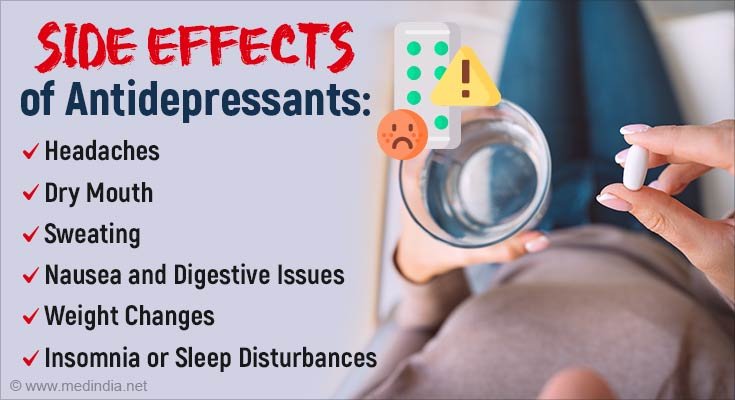Anti-Depressants to Treat Depression: Understanding the Side-Effects

- Antidepressants, crucial for depression and anxiety, bring relief but pose diverse side effects
- Individual responses vary; some may have no side effects, while others may experience nausea, weight changes, sleep disturbances, headaches, dry mouth, and sweating
- Collaborating with healthcare professionals for personalized care and proactive management empowers individuals on their mental health journey
Antidepressants, the stalwart medications in the battle against depression and anxiety disorders, offer relief to many, yet their efficacy is accompanied by a landscape of potential side effects that merit exploration (1✔ ✔Trusted Source
Antidepressants
). It is noteworthy that individuals may respond differently, and some may not encounter any side effects at all. Should you or someone you know encounter concerning side effects while on antidepressants, seeking guidance from a healthcare professional is paramount.
Advertisement
Side Effects of Antidepressants
Nausea and Digestive Issues:
Many antidepressants can trigger symptoms like nausea, vomiting, or diarrhea (2✔ ✔Trusted Source
Toward achieving optimal response: understanding and managing antidepressant side effects
). Consuming the medication with food or adjusting the dosage under the guidance of a healthcare provider may mitigate these digestive discomforts.
Weight Changes:
Fluctuations in weight, either gain or loss, can be observed in some individuals taking antidepressants (3✔ ✔Trusted Source
Weight gain and antidepressants
). Changes in appetite and metabolism play a role in these variations, and closely monitoring dietary habits may help manage weight-related concerns.
Insomnia or Sleep Disturbances:
Alterations in sleep patterns, such as difficulty falling asleep or vivid dreams, are potential side effects of antidepressants (4✔ ✔Trusted Source
Adverse effects of 21 antidepressants on sleep during acute-phase treatment in major depressive disorder: a systemic review and dose-effect network meta-analysis
). Establishing a consistent sleep routine and discussing concerns with a healthcare provider can aid in managing sleep disturbances.
Headaches:
Headaches often manifest as common side effects during the initial phases or dosage adjustments of antidepressant medications (5✔ ✔Trusted Source
Meta-analysis: Second generation antidepressants and headache
). Typically, this side effect diminishes over time as the body adapts to the medication.
Dry Mouth:
Antidepressants may lead to reduced saliva production, resulting in a dry or uncomfortable sensation in the mouth (6✔ ✔Trusted Source
Meta-analysis: Risk of dry mouth with second generation antidepressants
). Staying adequately hydrated and utilizing sugar-free candies or gum can provide relief from this particular side effect.
Sweating:
Increased sweating, especially during the night, is a potential side effect associated with specific antidepressants (7✔ ✔Trusted Source
Antidepressant-induced sweating
). While this can be bothersome, consulting with a healthcare professional can guide individuals in managing this aspect of medication-induced sweating.
Advertisement
Tailoring Antidepressant Use to Individual Needs
It is crucial to recognize that the landscape of antidepressants encompasses various types, each accompanied by its unique set of potential side effects. When embarking on the journey of selecting and trying an antidepressant, collaboration with a healthcare provider is of utmost importance, especially during the initial phases of adjusting to a medication’s effects.
Advertisement
Empowering Your Mental Health Journey
Understanding the potential side effects of antidepressant medications empowers individuals to make informed decisions about their mental health treatment. Open communication with healthcare providers ensures personalized care and strategies for managing side effects can be tailored to individual needs. By navigating the terrain of antidepressant side effects with knowledge and guidance, individuals can foster a holistic and effective approach to mental well-being.
In conclusion, the journey with antidepressants is a nuanced one, and awareness of potential side effects is a key aspect of optimizing mental health outcomes. Through collaboration with healthcare professionals and proactive management strategies, individuals can navigate this terrain with resilience and empower their mental health journey.
References:
- Antidepressants – (https://www.mind.org.uk/information-support/drugs-and-treatments/antidepressants/side-effects-of-antidepressants/)
- Toward achieving optimal response: understanding and managing antidepressant side effects – (https://www.ncbi.nlm.nih.gov/pmc/articles/PMC3181894/)
- Weight gain and antidepressants – (https://pubmed.ncbi.nlm.nih.gov/10926053/)
- Adverse effects of 21 antidepressants on sleep during acute-phase treatment in major depressive disorder: a systemic review and dose-effect network meta-analysis – (https://pubmed.ncbi.nlm.nih.gov/37422714/)
- Meta-analysis: Second generation antidepressants and headache – (https://pubmed.ncbi.nlm.nih.gov/29715610/)
- Meta-analysis: Risk of dry mouth with second generation antidepressants – (https://pubmed.ncbi.nlm.nih.gov/29274375/)
- Antidepressant-induced sweating – (https://pubmed.ncbi.nlm.nih.gov/15728327/)
Source-Medindia
Source link
#AntiDepressants #Treat #Depression #Understanding #SideEffects



